#we should talk about Leo masking more cause that's a major part of his character that basically doesn't get brought up at all by the fandom
Text
Another thing re: Nico being autistic-coded, is that we know with his whole “people tend to ostracize me for things beyond my control” thing, only half of that is because he’s a son of Hades.
We know this for sure because of Hazel and other character’s POVs - other characters explicitly describe being inherently uncomfortable around children of Hades/Pluto but being able to ignore that feeling most of the time after hanging around with them awhile. However, most characters don’t describe the same thing with Nico. They’ll get past the spooky part and be perfectly fine with Hazel, or even Nico’s powers, but there’s a second thing about Nico that the other characters - including Hazel herself! - all still register as being unusual.
The interesting thing here is there is another autistic-coded character in the series who describes the exact same phenomenon. Leo. The only difference between Leo and Nico (besides powers) is that Leo is near-constantly masking. He specifically notes that he masks for the sole purpose of making others like him more, because he has difficulties with social situations and feels very strongly that he thinks people wouldn’t like him as much or outright be hostile towards him if he wasn’t masking.
And this lines up with how pre-Nico’s spooky powers other characters tried to avoid him, simply because he was a hyper 10 year old who speaks a completely different social language to them. They’re all ADHD, so it kind of makes sense if someone comes in with a completely different social language it’s gonna throw you off. You can also possibly do some analysis with how Reyna initially felt off-put by Nico until she went on her quest with him and explicitly noted how they have similar body language/habits and went “Oh.” and from then on was totally fine with him.
anyways tl;dr: Nico feeling ostracized isn’t just because he’s a son of Hades but possibly even more because he’s simply autistic and nobody else speaks his social language. Leo experiences the same thing, because he’s also autistic, but to a lesser degree because he’s constantly masking.
#pjo#riordanverse#nico di angelo#leo valdez#analysis#anyways this analysis was brought to you by me who is adhd/autistic#we should talk about Leo masking more cause that's a major part of his character that basically doesn't get brought up at all by the fandom#autistic nico#autistic leo
483 notes
·
View notes
Text
Semblance of the Soul: Qrow and Raven
The Branwens are two people with a shared past, that have taken different routes in life:
Ozpin: Everyone has a choice. The Branwens chose to accept their powers and the responsibilities that came with them. And later, one of them chose to abandon her duties in favor of her own self-interest.
Qrow has made an altruistic choice. He hates the crimes of his tribe and is happy to help people by working for Ozpin.
Raven has instead decided to prioritize herself and her tribe and sees Ozpin’s cause as foolish and reckless.
At the same time, they are twins, but have chosen different families. This is why the concept of family comes up so often in their interactions. After all, they first meet in the episode called Family:
Raven: Hello, brother.
Qrow: Raven. So, what do you want?
Raven: A girl can't just catch up with her family?
And their last exchange is this:
Raven: Sorry, brother. Sometimes family disappoints you like that.
Qrow: We're not family anymore.
Raven: Were we ever?
Qrow: I thought so, but I guess I was wrong.
Still, how are they doing with their families of choice? Are they happy with them? Do they have healthy relationships?
For the both of them, the answer is no. This happens because Raven and Qrow are both scared to grow close to people.
It is just that this fear is declined in opposite ways. Raven is scared for herself (selfishness), while Qrow is scared for others (selflessness).
This trait they share, but show in different ways, is well conveyed by their respective semblances. This analysis will use their powers as means to explore both characters and their foiling.
RAVEN: BIRDS OF A FEATHER
Raven’s Kindred Link perfectly embodies the saying...
Birds of a feather flock together...
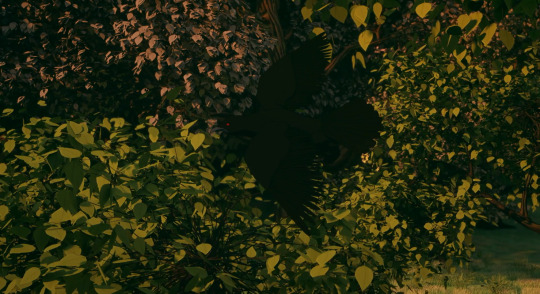
...until the cat comes:

Raven: I...I'm sorry...
On one hand it lets her create portals to the people she has a strong bond with.
On the other hand she mostly uses it to run away from those bonds.
Why does she do it?
The answer is clear:
Lionheart: I'm helping her for the same reason you are - I'm afraid. We... we can't stop her... no one can...
Raven is just another version of the Cowardly Lion. She is a coward like Leo, but does not aknowledge it and prefers to hide behind a pragmatic and survivalist mask:
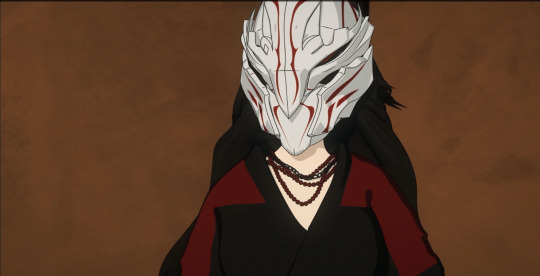
Raven: That's why I tried to leave when I did. I'm not afraid, I'm smart.
This is why she goes back to her tribe after she leaves Yang and Tai. She says she does so because she considers them her family and wants to protect them.
However, her motivations are implied to be more selfish. She goes to them to run away from things that scare her.
To be more specific, the tribe protects Raven psychologically in two different ways.
1) It lets her be the monster, the criminal, the most violent and powerful one:
Mercury: We’re the guys you should be afraid of.
Raven: I doubt anyone should be afraid of you.
Here, Raven mocks Mercury, but the irony is that her coping mechanism is really not that much different from his. She hides behind a Grimm mask, a universal symbol of fear, but she is the scared one.
2) She goes back to the family who raised her and neglects the family she is supposed to raise (Yang).
Deep down, Raven is just an adult, who fails at being an adult.
Mostly, this shows in her inability to make a choice:
Yang: Which is it, mom? Are you merciful, or are you a survivor?
As a matter of fact she keeps changing her mind because she is not brave enough to stick to one decision.
Initially, she is sent to Beacon, so that she could learn how to kill hunters. However, she ends up becoming a huntress herself and she accepts to fight Salem. She is considered so loyal that she is even given magical powers. Finally, she enters a relationship and has a daughter with Tai. She basically starts creating a life outside the tribe, only to leave it all behind at a certain point. It is not clear if it is because she saw something specific or if it is the result of a longer struggle.
The point is that nobody forced her to fight Salem. She could have also refused Ozpin’s powers. Finally, she could have told Ozpin and the others she wanted to stop. In any case, she did not have to leave her family to stop fighting Salem. What is more, she could have brought her family with her, when she ran away.
She chooses instead to leave everything she has built behind and goes back to the world she was a child in. It might be a violent world, but she sees it as safer.
Let’s highlight that she has the same tendency of changing idea in the series itself. She switches sides and organizes a risky plan, which puts almost all her major bonds (Qrow, Vernal and Yang) in danger. She does all that because she wants the relic, so that she has leverage against Salem. After all of this, even after Vernal’s death, she simply runs away. She is obviously shaken by her confrontation with Yang, who calls her out. However, Yang is perfectly right when she says so:
Yang: Because you're afraid of Salem!!! And if you thought having Maiden powers put a target on your back, imagine what she'll do when she finds out you have a Relic. She'll come after you with everything she has. Or she can come after me. And I'll be standing there, waiting for her.
Taking the relic would just put Raven in danger. For her it is safer to open the vault and disappear, so that someone else can take care of things. Even if this someone else is her daughter.
In other words, Raven is a failure of a mother. This is shown by her failing all three of her “daughters” (Yang, the Spring Maiden and Vernal). Moreover, it is perfectly conveyed by her being a Maiden.
The idea of maidenhood is symbolically juxtaposed to the one of motherhood. Of course, this does not have to be true in-universe for all the Maidens. Still, in Raven’s case, this juxtaposition is deliberate. Raven is an eternal Maiden, who runs away from her parental responsibilities.
This is why she received the power from her protegee instead than from a mentor figure. She is so selfish she takes from the people she should protect:
Cinder: Vernal was a decoy the whole time. The last Spring Maiden must've trusted you a great deal before she died. I bet that was a mistake...
What is more, it is strongly implied she killed the previous Maiden to take her powers. This is interesting because it ties to a second meaning of her semblance.
Her ability symbolizes the unfairness of the bonds she forges. She works to create those bonds and there is affection involved. However, these bonds are double edged swords for the other party involved because of Raven’s moodiness. She can leave when she wants and come back out of the blue. She can always go to others when she needs it, while others can never reach her. This leads to an unbalanced dynamic in Raven’s favour.
This dynamic can even become extremely dangerous for the other person:

Raven can potentially use her ability to attack the people she is bonded with. She does not use her semblance this way in the series. Still, what happened to the Spring Maiden is something similar. To receive the power of the Maiden, Raven must have been the last person in the girl’s thoughts before death. This probably happened because the two shared a close bond. A bond Raven betrayed.
In other words, the nature of Raven’s semblance hides in itself the potential of betrayal:
Raven: Aura can't protect your arm, it's Grimm. You turned yourself into a monster just for power.
Cinder: Look who's talking...
As Cinder points out, Raven too, like her, has become a monster to obtain power. The difference here is in how this montrosity is conveyed.
In Cinder’s case, she is literally turning into a Grimm. She has accepted this metamorphosis to take the Maidens’ powers.
In Raven’s case, it is ironically the opposite symbolically. She wears a Grimm mask, but the true monstrosity is the Maiden behind it:
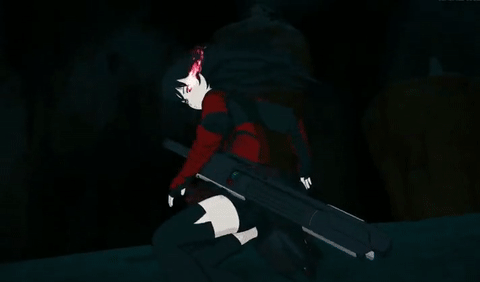
Raven is monster-like because she stole the power from a person, who trusted her.
Let’s highlight that the motif of the Grimm mask has come up several times in the series. So far, it has been used by people, like Raven and Adam, who want to be feared. Something similar can be seen in the Hound as well, who is not really wearing a mask, but whose humanity is hidden behind his Grimm appearance.
In all three cases, the true scary thing is what is behind the Grimm-face:
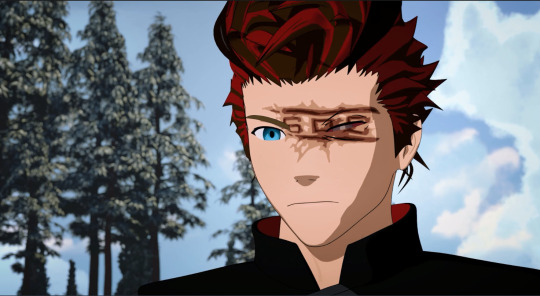
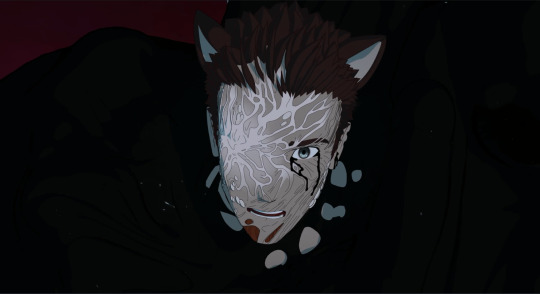
It is always the humanity behind it that is scary. Be it the victim behind the monster in the Hound, society’s mistreatment of Faunus or Raven’s cowardice and what it led her to do:
Yang: You're right. I don't know you. I only know the Raven dad told me about. She was troubled, and complicated, but she fought for what she believed in, whether it was her team or her tribe! Did you kill her too?
Yang’s question is poignant and underlines how all Raven has done is simply to hurt herself. By hurting the people she loves, she has been killing a part of herself.
This is also conveyed by her emblem missing from her possessions. According to the wiki, Raven’s emblem is this:
Raven's emblem is a winged eye with a clock inside of it. This emblem has not appeared on any of her possessions so far.
This is a reference to Raven and Qrow’s allusion to Hugin and Munin, Odin’s two ravens, who travel the world and bring him information. Raven and Qrow do the same for Ozpin and they are his eyes.
Qrow is the left eye:
Salem: The last eye is blinded... you disappoint me.
While Raven used to be the right. So, her emblem is probably the right version of Qrow’s own one. Still, Raven refuses that part of herself and this is why she is not wearing her emblem.
In short, Raven used to be a bird of a feather with Qrow, but she is not flocking together with him anymore. This is because a scary cat has come:
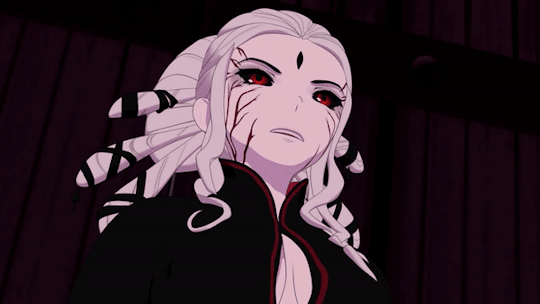
And Raven has sacrificed her bonds out of fear. Not only that, but she has weaponized them:
Yang: You turn your back on people, you run away when things get too hard, you put others in harm's way instead of yourself!!
Raven has been using her most loved people as assets, so that she can shield herself from danger. Maybe it is because of this that she symbolically uses Omen to open portals. This even if she can apparently do so without it, since she opens them even as a bird. However, using her sword is a way to distance herself from the true nature of her ability (bonds). It is a way to reduce her ties with people to simple things she can use.
That said, this is damaging Raven herself.
To be more specific, she is making herself weaker and weaker:
Yang: Oh, shut up!! You don't know the first thing about strength! (...) You might be powerful, but that doesn't make you strong.
Raven is powerful, but weak. This weakness is symbolically conveyed by her behaving in the opposite way her semblance would need to truly shine.
Raven’s power works thanks to bonds, so it can be assumed it would be at its strongest if its user cultivated them both in quality and in numbers. However, Raven has few bonds and she is cutting them off one by one:
Yang: You can bond to certain people. And when you do, you could create a portal that takes you straight to them. You've got one for Dad. One for me. And you've got one for Qrow.
We know that Raven is also bonded with Vernal. Still, Vernal dies at the end of volume 5. Of the other ones Yang mentions, Raven has pushed away both Qrow and Yang through her actions at Heaven.
This makes this scene interesting:
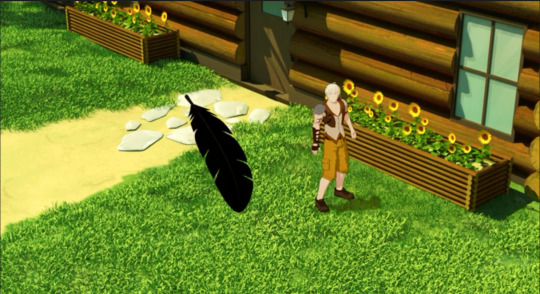
Did the portal Raven opened at Heaven go to Tai? Did she go there because she felt nostalgic and missed him? Or is he the only one (both practically and symbolically) she can still run to?
QROW: A SCARE-QROW SCARED OF CROWS
Qrow’s semblance is Misfortune and it is basically a Bad Luck Charm:
I am no one's blessing
I'll just bring you harm
I'm a cursed black cat
I'm an albatross
I'm a mirror broken
Sad to say I'm your bad luck charm
Qrow causes bad luck around himself. Because of this, he sees himself as a curse.
However, this conflict Qrow has with his semblance is actually symbolic of a turmoil developed on multiple levels.
Let’s begin with this:
Raven: You're the one who left. The tribe raised us, and you turned your back on them.
Qrow: They were killers and thieves.
Raven: They were your family.
Qrow: You have a very skewed perception of that word.
Qrow was born in a tribe of bandits and was taught how to kill and steal. Finally he was sent to a hunter academy, so that he could learn how to kill his classmates in the near future.
Qrow’s semblance is nothing, but the manifestation of his self-hate, that was probably partly caused by the environment he was born in. In a sense, it is his symbolical response to his childhood.
Let’s highlight that this response is very different from Raven’s. This is shown by their opposite behaviours toward their tribe. Qrow leaves it, while Raven goes back to it.
This difference can also be conveyed by how both Raven and Qrow share a specific motif, but embody it in different ways.
Both twins are associated with bad luck. Both can turn into ravens/crows, which are birds linked to misfortune. Moreover, their weapons are called respectively Omen (Raven’s) and Harbinger (Qrow’s).
The meaning is clear. The twins were born and raised with the idea that they should be symbols of violence and bad luck for their enemies. It is just that Raven wants to be a bad omen because it makes her feel strong. Qrow does not want it, but thinks he is:
I'm a harbinger,
I cannot lie,
I will change the color of your life.
It is to try and free himself from this curse that Qrow started working for Ozpin. He literally becomes the Scarecrow of the story to try and exorcise the bad fortune he brings. He is trying to scare the crows away. He thinks that if he does so, he’ll become a full person.
This ties with the original story of his allusion. In The Wonderful Wizard of Oz, the Scarecrow wants a brain because he is told by an old crow he would be just like a real man, if only he had one. In short, the Scarecrow wants a brain to become a real man, so that he can scare crows better than he already does.
Qrow too wants to be a full person, but he believes he is not. He thinks he is cursed and as a reaction to this he has attached himself to Ozpin and to his cause:
Qrow: No one wanted me... I was cursed... I gave my life to you because you gave me a place in this world... I thought I was finally doing some good...
This is why he reacts so badly when he discovers that Ozpin (who is basically a father figure for Qrow) has hidden so many things from him. Not only that, but he feels that the impossibility of truly defeating Salem (of truly defeating evilness) makes his life meaningless.
The point is of course that this is not the case and that Qrow does not need to do anything specific to be a true person and to be loved:
Qrow: Every choice I've ever made has led me here, and I've dragged you along with me. Oz, myself, the others... We're responsible for the mess the world's in now. I shouldn't have come, shouldn't have let any of you come... What was I thinking?!
Ruby: We're all in this together, and we're all going to do the best we can. That's all anyone can do. And I know it's what you've always aimed for. We would've come whether or not you'd let us, so stop talking like we're your responsibility! We're not! But we could still use Qrow Branwen on our side.
Ruby’s confrontation with Qrow at the end of volume 6 is basically the opposite of Yang’s confrontation with Raven in the finale of volume 5.
Yang calls Raven out because she refuses her responsibilities. She pushes them on others and leaves her own daughter to fight a battle she ran away from.
Ruby calls Qrow out on taking too much responsibility on himself. The kids were not forced by him to come. Qrow should not be completely responsible for them, but should learn to fight by their side.
Later on, Qrow is basically told the same by Maria:
Maria: You weren't half bad yourself today, Qrow.
Qrow: I feel like they did all the heavy lifting.
Maria: But you were there to help when they asked for it, and you were there to catch them when they fell. Literally, if I recall.
This is important because Maria appears just after Ozpin (aka Qrow’s mentor and guide) disappears. She is the person Qrow aspired to be:
Qrow: You never used your name, never showed your face. Lots of us thought you were just layin' low. Eventually, we just came to accept that you were probably dead. But the stories about you, I based my weapon off of yours. I wanted to be as good as the Grimm Reaper.
At the same time, Maria too, like him, considers herself a failure:
Maria: Well, I'm nothing but a disappointment, so you're well on your way.
However, at the end of the volume both Maria and Qrow realize that they do not have to save the world by themselves or to be invincible heroes. They just need to be there for their loved ones and the new generations. In short, Maria mentors Qrow on how to be a proper mentor.
And it turns out that he just has to take better care of himself:
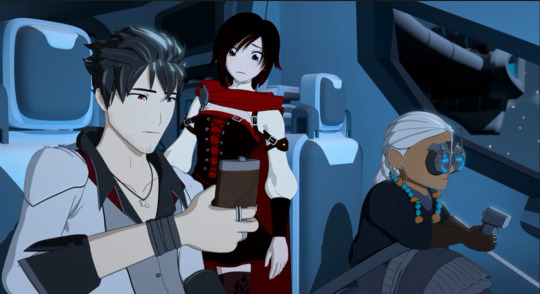
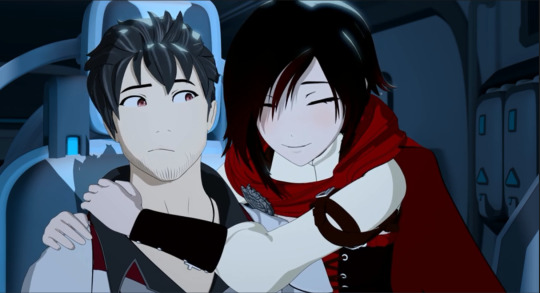
In short, Qrow became the Scarecrow to scare crows, but ironically all he needs to do is to overcome his own fear of one Qrow.
If he does not, his semblance is bound to become a self-fulfilling prophecy, as it is shown in his two fights against Tyrian (vol 4 and vol 7).
1) In volume 4 he manages to protect Ruby, but ends up injured and unable to help the kids for the rest of their journey. He goes from their protector to a wounded man they have to take care of.
Narratively, it happens because of this:
Ruby: This is a lot to take in, and it all sounds crazy, but... I'm willing to do whatever I can to help because I trust you. But why couldn't you trust me? Why couldn't you just travel with us, instead of this secrecy, and, and--
Qrow: Look, this has nothing to do with trust. I-- It's a long story, okay?
The whole fight between Tyrian and Qrow could have played out very differently if Qrow were better at communicating with his niece. He wanted her away from Tyrian and himself because of his semblance, but Ruby interpreted it as Qrow not trusting her.
2) In volume 7, the battle ends with Clover’s tragic death being framed on Qrow.
Why does it happen?
Clover: Sometimes the right decision is the hardest to make. I trust James with my life! I wanted to trust you.
Once again, the problem lies in a lack of trust.
Qrow and Clover genuinely like each other and have bonded. Still, they fail to trust each other in a key moment and make the worst possible choice.
This is true for both characters:
Clover: I enjoyed working with you, you know. Even with that endless cynicism of yours.
Qrow: I'm usually proven right.
Clover: We don't have to fight, friend.
Qrow: You don't know my friends. That's how it always goes.
Qrow: Why couldn't you just do the right thing instead of the thing you were told?
In a sense, the whole fight can be read as The Scorpion and the Frog. In the original fairy-tale, the point is that one can’t overcome their own nature. The scorpion will sting the frog even if it goes against its own survival. Here, it is the same for the characters. In order for things to go well, either Clover or Qrow should overcome their flaw, but they fail.
Clover is not able to let go of his loyalty for Ironwood, even if it is clear the orders he received are wrong.
Qrow goes back to his usual cynism and makes a pact with Tyrian:
Robyn: I’m sorry for what happened. It wasn’t your fault.
Qrow: It was, though. I made a deal with the darkness, and he paid the price. It was all happening so fast, but Clover wouldn’t let up. Could have worked together against Tyrian if Clover just...
Tyrian is the poisonous scorpion, while both Qrow and Clover are two frogs, who are hurt by him. Ironically, the frog’s mistake in the story is to trust the scorpion, while the mistake of our two frogs is that they did not trust each other.
Still, why is it so narratively? To be more specific, why is that so when it comes to Qrow’s character?
The answer is here:
Qrow: But the thing that really stings? For the first time in a while I thought, maybe, maybe I could be around somebody - anybody - without my semblance making it… complicated. And now, it just feels like a childish dream. Gone... like everybody else.
Clover is narratively this:
Blake: You have to understand that all of you are looking for simple answers to a very complicated problem.
He is a very simple answer to a very complicated problem that has its roots in Qrow’s interiority. Qrow’s flaw, what goes in the way of his relationships and happiness, is not that he is unlucky, but that he feels unlucky.
He feels worthless and thinks of himself as bad for others. This is why he keeps his distance and refrains himself from growing close to people.
He blames it on his semblance and this is why he makes an exception for Clover. It is because he sees in the other’s ability an easy fix to his struggle.
Still, he is proven wrong because in the moment of truth, they fail to communicate and everything goes to hell.
This is not to say that Qrow and Clover’s relationship was bad or that Clover deserved to die. In-universe their bond had beautiful aspects and could have grown stronger. Moreover, Clover could have developed and left his flaw behind.
Still, narratively Clover serves a specific purpose and him dying is a part of said purpose.
Clover brings a superficial harmony to a situation and a group dynamic, which is actually not harmonic at all:
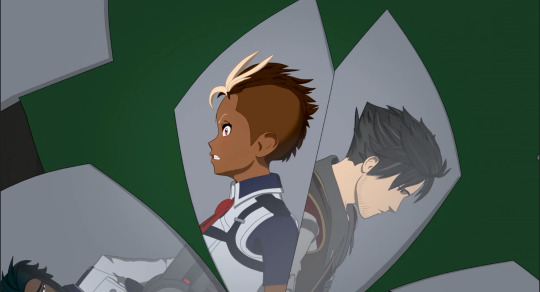
Clover: What would you guys do without me?
The Ace Ops are a group of individuals repressing their own feelings and identities for the sake of an unspecified greater good. They see the world in black and white, not because they are stupid, but because they refuse complexity:
Robyn: Yeah, because you don’t care about the truth. You just want someone to be mad at. Easier than taking an honest look at what side you’re on.
Winter: Penny. The general is making hard choices so we don't have to.
This fits with them being a group based on Aesops aka short stories with a very well defined and often simplicistic message.
In short, Clover is the one that keeps his group together. Once he is gone, his group starts deteriorating. All because they refuse to aknowledge their feelings:
Ren: That’s why you lost against Team RWBY. You, you try to fight how you feel about each other, so you’ll never truly work as a team.
Once he is gone, Qrow is similarly forced to grieve and self-reflect. Luckily, he is not alone:

Robyn is the opposite of Qrow in terms of symbolism.
Qrow is associated with crows and bad luck, while Robyn is linked to robins, which bring good fortune.
She is also a symbol of unity and hope (her emblem is basically Katniss’s symbol in the Hunger Games, after all):
Tyrian: Robyn Hill. For such a little bird, you have quite the impact around here! Bringing hope and a smile wherever you go! I find it…upsetting.
Despite this, Robyn too has suffered isolation, just like Qrow:
Robyn: Believe it or not, I know a little of what that’s like. When people are worried you’re gonna sniff out their secrets, they tend to push you away. It makes a real connection… difficult.
Qrow: I-- never thought of it that way.
Robyn’s line is important for two reasons.
a) It shows Qrow that he is not the only one who has met difficulties in life because of his semblance. His case is not unique.
b) It links to the idea that trusting others is difficult and it is not something that comes without dedication and work.
As a matter of fact Robyn’s semblance is specifically symbolic of trust. It is the power to detect lies through touch, so if you are going to work with her, it means you must be ready to trust and to be trusted:
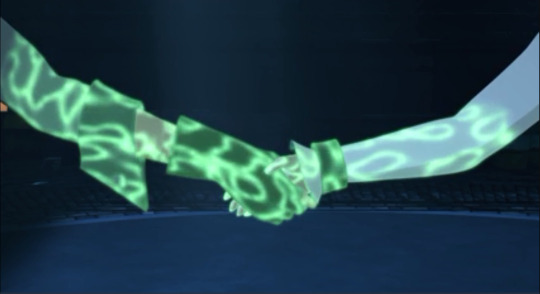
This also ties figuratively with the act of shaking one’s hand as if to make a pact (an act of trust). If Raven’s power is about asymmetrical bonds, then Robyn’s is about mutual ones.
Robyn highlights that this creates problems for her because it is not easy for people to trust. Some can’t be trusted, while others do not trust Robyn won’t cross their boundaries.
However, this also means that the relationships Robyn manages to forge are strong bonds, where everything or almost everything is out in the open. This is the exact opposite kind of environment than the one realized through Clover’s good luck semblance. It is a harmony more difficult to reach, but it is a more stable and genuine one.
It is these kinds of bonds Qrow should aim to create. In order to do so, he must accept his semblance and his past as parts of themselves. Still, he should not let them define him. Not only that, but he should learn to trust others and their strengths:
Qrow: Ruby, stop!
Ruby: I need you to trust me.
Only in this way, Qrow can truly grow. The secret is that it was never about scaring the crows away, but to learn how to live with them.
HUGIN THAT RUNS AWAY AND MUNIN THAT MAKES EVERYONE WORRIED
Raven and Qrow’s issues can be synthesized by this quote:
"Hugin and Munin fly each day over the spacious earth. I fear for Hugin, that he come not back, yet more anxious am I for Munin."
Raven never comes back, while Qrow has his loved ones fear for him because of his self-destructive tendencies.
In order to overcome these flaws, they must grow in opposite directions.
Raven must realize that her survivalism is actually self-destructive. It makes her survive, but it negates her the chance of living. She must become more selfless and trustworthy to make it up for the unfair bonds she created.
Qrow must accept that his self-destructiveness is actually selfish and damaging to his loved ones. He must start to trust others’ strengths, so that he can be brave enough to live together with them, instead of looking at them from afar.
#rwby#rwby meta#qrow branwen#raven branwen#robyn hill#clover ebi#tyrian callows#my meta#semblance of the soul
230 notes
·
View notes
Text
TOM HARDY SAVES THE DAY (NO, REALLY)
One of the most intense actors of our time agreed to take us on a motorcycle tour of his hometown—and then the day spun way off-script.
ERIC SULLIVAN AUG 7, 2018
We're at the first stop on Tom Hardy’s literal tour down memory lane, and he’s already causing trouble. The caretaker of St. Leonard’s Court, an apartment building in the leafy London suburb of East Sheen, comes out to the driveway to say that a tenant has lodged a noise complaint. Hardy leans back in the saddle of the offending source, a Triumph Thruxton fitted with a not-so-subtle 1200cc engine. “Must be hard for someone who’s home at 3:00 p.m. on a Tuesday doing fuck-all, innit?” he says to the caretaker, who’s already in retreat. Then, overriding his knee-jerk snark: “It won’t happen again.”
“I’m the youngest person to own a flat on this block,” Hardy, forty, tells me, sounding both proud and bemused. He bought the place fifteen years ago, moved out six years later, and now uses it as a crash pad for out-of-town guests. He didn’t choose the location for its social scene, if the few geriatric residents shuffling by are any indication. Rather, he was the prodigal son returned: He grew up in the upper-middle-class community, the only child of Chips, an adman and writer, and Ann, an artist. His parents still live nearby.
“Ready for the five-dollar tour?” he asks. Our plan is to trace the path from what he calls his “privileged bourgeois background” to the upper-upper-class town of Richmond, where he now lives with his wife, actor Charlotte Riley, and their child, his second. (He also has a ten-year-old son with assistant director Rachael Speed.) The journey is short in distance—a little more than two miles—but ultramarathon-long in life experience.
“Behind the Laura Ashley curtains, there was naughtiness and fuckeries!” he begins like an overenthused docent. I point out that’s a line he’s delivered many times to many writers. He shrugs. “It’s easier to say that than to go deep-sea diving into it.” To Hardy, a fiercely private man and a reluctant public figure, the canned story serves the useful purpose of making an unsuspecting person feel like they’re getting to know the real Tom. “Should we fuck off?” he asks as we pull on our gear. Except for the beat-up jeans, his five-foot-nine frame is covered in black, from his helmet to his motorcycle boots. We get on our bikes and fuck off.
Five minutes later, just past the prep school he attended as a boy, Hardy spots a commotion, and we pull over. A woman, blood covering her face, lies faceup, half on the sidewalk and half in the street. A few bystanders are crouched around. As Hardy approaches, he says, “I know her.”
It's Mae, the mother of one of Hardy’s childhood best friends. [Some names have been changed.] He drops to one knee and takes her hand in his. Someone in the crowd tells us that Mae tripped while walking her dog. She’s slipping in and out of consciousness.
“Mae, it’s Tommy,” Hardy says. “Squeeze my hand. Keep talking to us. Can you open your eyes?” She moans. He tries out a joke. “Are you Canadian?” he asks. She manages a word: “No. ” He says, “Not even a little Canadian?” She doesn’t reply. By the time the ambulance arrives, Mae is responding, but barely. Shortly after, her son Albert pulls up on his bicycle. When he sees his mother laid out, he bites his fist. Hardy wraps his arms around his friend, both to comfort him and to keep him at a safe distance.
The paramedics load Mae onto a stretcher, and Hardy asks if they can bring Albert, too, then asks again to make sure they remember. They say yes, but they’ll first check Mae’s vitals.
After the ambulance doors close, Hardy turns his attention back to Albert. “Your mom took a whack to the forehead. But I’m not concerned immediately, ’cause she’s responding better than when we arrived. And ’cause they’re not rushing off. You settle in at the hospital, and then we’ll meet you.” Albert protests, but Hardy stops him. “I’m one of your best mates, and I love you.” He slips money into Albert’s pocket. “Just for now,” he says. As soon as the ambulance leaves, bound for Kingston Hospital, he calls Albert’s wife.
For the half hour we’ve been here, Hardy has not stopped moving. He’s talked himself through each step as if checking off boxes on a crisis to-do list. Suddenly, he turns to me and considers our circumstances. We began the day as writer and subject, but that dynamic dissolved the moment he saw Mae. “There was no interview here,” he says. “We find ourselves in a situation where we needed to put everything on hold.” A smile cracks across his face. “Welcome to my neighborhood. I told you there’s always something to find behind the Laura Ashley curtains.”
Private Tom and Public Hardy: These are the two sides that define him. That his time is split between work life and family life, and that his obligations toward both are sometimes at odds, isn’t unique. However, his steadfast struggle to separate them is; he’d be thrilled if never the two should meet. But they do, with increasing frequency, in ways that are beyond his control.
Public Hardy may be an accomplished actor in the U. S., but in his home country he’s a national treasure. In June, he was awarded the title Commander of the Order of the British Empire, which, while not as prestigious as knighthood, is on the same scale. In February, Glamour UK named him the sexiest man of 2018. Madame Tussauds in London recently displayed his likeness reclining on an oxblood chesterfield couch, one arm perched atop the back cushion like an invitation. (“Cosy up to Tom on his leather sofa and feel his heartbeat and the warmth of his torso in what is surely the hottest seat in town,” hypes the wax museum’s site.) He tells well-worn anecdotes to keep Private Tom concealed, and he’s always on alert.
We meet for the first time the day before the accident, at the Bike Shed, a motorcycle club and café in Shoreditch where, last year, he spent his fortieth birthday. It’s Hardy’s favorite place in London—not surprising, as he’s an investor in the company, which plans to open a location in Los Angeles soon. Every few minutes during our conversation, he nods hello to yet another bearded, inked-up passerby. He’s wearing a loose T-shirt and cargo pants with enough pockets to fit all the world. Brown fuzz dusts the crown of his head. A copper beard stippled with gray blankets the lower half of his face.
He answers my first question—how he’s doing—without missing a beat: “I’m tired.” He’s been working a lot, mostly on Marvel’s Venom (October 5), in which he plays the title role, a reporter named Eddie Brock whose body is hijacked by an alien symbiote. Venom has remained one of Spider-Man’s best-known foes since he first appeared in comic-book form in the late eighties. At times, he’s an outright villain; at others, including in Hardy’s hands, he’s more of an antihero. He can’t discuss the plot, but he says the tone of the movie, directed by Ruben Fleischer (Zombieland), is “dark and edgy and dangerous.”
The three-month shoot, which ended in January, took him to Atlanta, New York, and San Francisco, where the movie is set. “I see America by where the tax breaks are,” he jokes. Next, he headed to New Orleans to play a syphilitic Al Capone in Fonzo, directed by Josh Trank (Chronicle). That crew went hard: nineteen hours a day for six weeks. The day they wrapped, he flew home, threw on a suit, and attended the royal wedding with Riley. (All he’ll say about why they landed the coveted invite is that “it’s deeply private” and “Harry is a fucking legend.”) The work wasn’t the hardest thing; it was, he says, spending such long stretches away from his family.
Yet workwise, Hardy has arrived at what you might call a stakes moment, one that’s twenty years in the making. At the dawn of his career, after landing just two small roles, albeit in big projects—Band of Brothers and Black Hawk Down—he scored his first major part, as the bald, asexual villain in 2002’s Star Trek: Nemesis. But the movie tanked, snuffing buzz over his excellent performance. Five years of forgettable films and a few distinguished stage performances passed before Hardy played lead roles that fully showcased his talents: the homeless drug addict with a heart of gold in the BBC’s Stuart: A Life Backwards (2007), for which he shed nearly thirty pounds, and the most violent inmate in Britain in Bronson (2009), for which he packed on fifteen pounds of muscle.
Physical change is just part of Hardy’s exacting, chameleonlike transformations. “One can embellish with flair or an accent,” he says. “But ultimately you need to ground the character in some form of recognizable truth.” Hardy will talk your ear off about acting theory— Stanislavsky versus Adler, presentation versus representation, the use of clowning and mask work. “I’m a complete geek about it,” he says. But those seams don’t show. At his best, Hardy so thoroughly embodies a character, in both body and spirit, that he all but disappears.
Take a scene from 2015’s The Revenant. Hardy plays Fitzgerald, the coldhearted fur trapper and the target of revenge for Leonardo DiCaprio’s Glass. One night, around a campfire, Fitzgerald makes a veiled threat to a suspicious travel companion. He never raises his voice, but it’s as if he’s ripped out the man’s heart. Hardy’s performance earned him both an Oscar nomination and, after losing a bet with DiCaprio over whether he’d receive such recognition, a tattoo on his right arm that reads leo knows all.
His knack for magnetic unease can inject a blockbuster with edge: Mad Max: Fury Road, Inception, and, most notably, The Dark Knight Rises. But aside from Fury Road, whenever he’s assumed the lead role—Lawless, Warrior, This Means War, The Drop, Locke, Legend, Child 44—the results have come up short critically, commercially, and sometimes both. Venom is Hardy’s most visible role yet.
“Sounds like a lot of pressure, doesn’t it?” he half-jokes. But he says he’s not concerned about box-office returns; as always, he’s consumed with building a good character. He admits he knew little about Venom when he first read the script. “So I spoke to the only person I could really trust in this environment: my older boy.” His comic-book-loving son “was a huge influence on me doing the role.”
Hardy prepped for the movie for more than a year. He undergoes a rigorous process to shape each performance, complete with its own argot. A script is a “case file,” to be “unpacked” via “investigation.” He often begins by using personalities, both real and fictive, as lodestars toward which he guides his portrayal. The voice he developed for Al Capone in Fonzo is based on Bugs Bunny’s; to prove it, he plays me a clip of the raw footage on his phone. Sure enough, he sounds like the cartoon rabbit with a severe case of vocal fry. In Venom, the dual roles of Eddie Brock and Venom reminded him of three wildly different traits of three wildly different people: “Woody Allen’s tortured neurosis and all the humor that can come from that. Conor McGregor—the überviolence but not all the talking. And Redman”—the rapper—“out of control, living rent-free in his head.” Those are not details he revealed to the execs at Sony, which is producing the movie. “You don’t say shit like that to the studio,” he says.
“IF THE ODDS ARE STACKED AGAINST SONY, THAT’S NOT MY FUCKING BUSINESS. IT'S IRRELEVANT.
“If the odds are stacked against Sony, that’s not my fucking business,” Hardy says. “It’s irrelevant.” He burnishes an image of himself as a creative lone wolf, and in the third person no less: “Tom is very mercenary when it comes to work. I cannot give a fuck what the writer, or the director, or Larry in Baltimore thinks about my choices.” (He later clarifies the perspective shift: “Sometimes I talk in the third person because it’s a lot easier to see myself at work as a piece of meat. So when Tommy says he doesn’t give a fuck what you think, it’s only because I give too much of a fuck, and it gets to a point where it stifles me.”) But it’s hard to square his claims of artistic purity with the occasional very non-lone-wolf detail like, “Market research shows that the biggest fan base for Venom is ten-year-old boys in South America.”
If this movie does well, there will be sequels. And if Sony builds its cinematic Spidey universe, Hardy may well appear in those, too. Beyond those commitments, he’s vague about his post-Fonzo plans, most of which don’t involve acting. “What I’d like to do is produce. Write. Direct,” he says. Through his production company, Hardy Son & Baker, he’s working on the second season of Taboo, a moody period drama set in early-1800s London that he stars on and cowrites with his father. The first season was a mixed bag—its premiere ranks as one of the most streamed episodes of any BBC show, but historians criticized its accuracy and U. S. viewers met its FX airing with indifference—yet his stature is such that the BBC green-lighted the second season. He also optioned Once a Pilgrim, a thriller by a veteran of the Parachute Regiment, the elite airborne infantry of the British army; he’s considering directing the adaptation.
Hardy’s future looks rosy. And yet, more than anything, he feels worn down. Physically, sure: He’s walking with a limp. He says he tore his right meniscus on the set of Venom, but he doesn’t know how it happened. “At the end of a job, I normally end up on the side of the road,” he says. “And then carrying the toddler around on my shoulders. . .” He lets loose a two-note cackle. “Things get in the way of looking after yourself.”
But the fatigue is also mental. Maybe it’s because the growing demands of the job, especially the time spent far from his wife and children, are beginning to outweigh its diminishing gratification. When I ask if being forty has changed how he feels about his career, this time he answers in the second person. “You’ve summited Everest. It’s a miracle that you’ve made it anywhere near the fucking mountain, let alone climbed it. Do you want to go all the way back and do it again? Or do you want to get off the mountain and go fucking find a beach?” He tugs his left temple so hard that it looks like the skin might tear. “What is it that draws you to the craft? At this age, I don’t know anymore. I’ve kind of had enough. If I’m being brutally honest, I want to go on with my life.”
After the ambulance leaves with Mae and Albert, Hardy suggests that we stop at a few places on our way to the hospital. Not for my benefit, but for his friend’s. “Albert needs to be alone with his mum and his thoughts,” he says. “He’s going to be taking care of her, so it’s important he pays attention. Sometimes, when there are other people around, that’s hard to do.” Hardy isn’t trying to swashbuckle; he’s thinking of how to best help two loved ones. And, apparently, a guy he just met: Looking me up and down, he says, “We’ve had a bit of a shock ourselves. We could use some sugar.” We set out for a refreshment stand in a nearby park he first came to as a toddler with his mother to paddle around the kiddie pool, and then as a teen with Albert and others to play rugby.
When we arrive, the stand is closed. As we get back on our bikes, a father walks by carrying his son, a chubby boy with an explosion of straw-colored curls. “How old are you?” Hardy asks the boy. “He’s two,” the dad beams.
“When will you be three?” Hardy asks.
“July,” the toddler says softly.
“That’s really soon!” he says. “You’re a bit older than my youngest, who’ll be three in October. Oh, you’ll be a big boy by then. You’re already a big boy. Do you want to sit on my bike?” The boy buries his face in his father’s chest. “I appreciate I’ve made you feel nervous. This is what I will do: I will disappear,” he says, which could double as his two-sentence acting manifesto. He revs his engine over and over. As we depart, the boy watches Hardy, his mouth agape.
We cut into Richmond Park, a twenty-five-hundred-acre expanse that’s equal parts polished and untamed. When something catches Hardy’s attention—stags in the brush, a view of the Thames, a tree with knotted bark—he raises two fingers to his eyes in a V, then points so I see it too, like I’m his Dunkirk wingman.
We pull over at a dead end. With our engines rumbling, Hardy tells me that his parents moved to this part of London to enroll him in the best schools they could afford. The area is among the wealthiest in the UK, but it’s also an economic patchwork where council houses sit blocks away from mansions. “Growing up, you mix and mingle. You can sit in the shit if you want to, or you can make something of yourself,” he says. “Or you can end up under too much pressure and fading out young.”
As a child, Hardy had a strong relationship with Ann, but he butted heads with Chips. Father and son made up years ago, and Hardy resists going into detail about their difficult past. “My father was the most wonderful of teachers in a world that can be cruel,” he allows. “He treated me like an adult, as opposed to changing his persona for his child. There was no filter. Do you understand? No filter.”
In his teens, Hardy wobbled. “The centrifugal force in my life is a natural disposition to not be happy with the way I feel,” he says. That, combined with a robust contrarian bent—“Nine times out of ten, when somebody says, ‘Don’t do that,’ my instinct is to say, ‘That has to be done’ ”—got him into a fair bit of trouble. He hung out with the wrong crowds; he fought in school. “I grew up in the neighborhood being a dick,” he says. “I’ve learned and will continue to learn from being a dick. To try and somehow chisel myself into being a human being so I can respect myself when I look in the mirror. And that’s a procedure that will go on until I die.”
Starting at thirteen, he struggled with alcoholism and other addictions. He still has a soft spot for those with similar demons. In April 2017, when two kids riding stolen mopeds were T-boned at an intersection and tried to run, Hardy, who lived nearby, apprehended one of them. The Sun headline sums up how the press covered the incident: “Tom Hardy Catches Thief After Dramatic Hollywood-Style Chase Through Streets Before Proudly Saying, ‘I’ve Caught the C**t.’ ” He disputes the details of what was reported— “It wasn’t much of a chase; when I found him, he was in fucking rag order”—but that’s beside the point. The tabloids missed the real story: After the incident, he tracked down the kid he turned in and got him help. “He must stand accountable for what he’s done,” Hardy tells me. “But he’s got issues, and he’s in a bad way. Do we just give up on a sixteen-year-old?”
As a boy, Hardy was given second, third, and fourth chances. Along the way, he discovered that acting offered an outlet for his baneful discontent. He attended one drama school, then another, got kicked out twice, and was cast in Band of Brothers before he graduated.
Still, for years, he questioned his chosen path. Hardy even signed up for a Parachute Regiment training course—but never followed through. “Oh, mate, I did so much backpedaling,” he says. “The reality is that where I belonged was not there. The last person defending the realm was Mr. Hardy.” He calls the decision to back out “one of my biggest regrets. I wonder what life would’ve been like. I would’ve loved to have served and been useful.”
In 2003, at twenty-five, Hardy cleaned up with the help of a twelve-step program—he calls it “my first port of call”—and he’s been sober ever since. “It was hard enough for me to say, ‘I’m an alcoholic.’ But staying stopped is fucking hard.” Sitting on his Triumph, at the center of the place that held all the risks and possibilities that would define him, Hardy sounds almost wistful.
We take off through the park. He rides with his legs bowed out, his left hand resting on his knee, and his right hand holding steady on the throttle. When he rips on a vape pen, white plumes swirl around his head and dissipate into the damp air.
We head to Richmond. The town sits within the borders of Greater London, but its roots are as much in the countryside as in the city. Generations of famous Brits seeking refuge have called it home: Queen Elizabeth I liked hunting stags in the park; Charles I relocated his court here to avoid the plague; Mick Jagger lived near the Thames with Jerry Hall, who, though now married to Rupert Murdoch, apparently still co-owns the home they shared.
We stop at a café around the corner from Hardy’s place. The wall between us that crumbled upon seeing Mae—or seemed to, anyway—is fortified just as quickly. When Private Tom reaches playfully for my stack of questions and I instinctively pull them back, he casts a leery eye. “I see I’m not in the circle of trust,” Public Hardy says, when in fact I just got booted from his.
“Can I get a double espresso?” he asks our waiter.
“For sure,” the waiter says. “By the way, big fan. I always know if you’re in a movie, it’s going to be a good one.”
“Thanks. But don’t put your money on that,” Hardy says. “I’ve got to be crap at some point.”
“I would say you’re one of my top three best,” the waiter says. “Action actors,” he clarifies.
“I think I’m a bit too old now for action.”
“Except for the next Expendables,” the waiter jokes.
“I’m tempted to ask who the other two are,” Hardy says after the waiter walks off. “I showed great restraint. Great restraint.” He might claim that the opinions of others don’t matter, but this is driving him crazy. “Who are the fuckers?”
When the waiter returns, I ask. “Mark Wahlberg,” he says without delay, as if he were waiting for the question. Hardy, stone-faced, says nothing. “And Matt Damon.”
Finally, Hardy speaks. “Can I give you this?” he says, handing over a plate, any plate, just to send the waiter on his way. Almost as an afterthought, he adds, “Thanks, man. Good company.”
He deals with this sort of thing all the time. “I’ve crossed the line of being a public figure. And I accept that means to a certain degree I’m public property,” he says, “even though I project an image of myself to them,” acknowledging Public Hardy in all but name. Most people he meets are lovely. But “the downside of being overt is you invite darkness,” he says. “It only takes one person to cause real harm.” He defends himself as if someone has called him out. “That’s not being paranoid. That’s just facts.”
“THE DOWNSIDE OF BEING OVERT IS YOU INVITE DARKNESS. IT ONLY TAKES ONE PERSON TO CAUSE REAL HARM.”
By filtering which parts of himself become public, he’s mostly okay with the balance of Private Tom and Public Hardy. Except, that is, when it comes to his children. “I will pose for you, and photos of me and my wife are fine,” he says. “But if someone takes a photo of my kids, all bets are off. I will take the camera off you and beat the fucking shit out of you.” His voice contains no hint of exaggeration. “That’s the one that hurts. My kids didn’t ask for what my job is.” He pauses. “There’s something that really upsets me about the imposition of a grown-up world on a child.”
When we spoke earlier about his relationship with Chips, he said he was working to become a better father by learning from the mistakes of his own. “In trying to protect my children, I’ll probably give them their own dose of problems,” he told me. “But I don’t want them to go through what I went through.”
At Kingston Hospital, we make our way to Mae’s room. She’s feeling better, but dried blood still cakes her face. She and Albert don’t know who or what to expect next, or how long it will be. Hardy asks what she remembers—“Hit the pavement,” she says. “Made a nice sound”—and what still hurts. We unload snacks we brought, and then we wait.
The three relax into a familiar rhythm. Age has smoothed but not erased the boys’ mischief and the mom’s sass. Hardy jokes to Mae, “All right, lovely, want salt-and-vinegar chips with a side of infectious disease? Pick up a little souvenir?” She smirks.
Hardy squeezes some sanitizer onto his hands and rubs it, then reaches for a chip. “Don’t do that,” Mae says. “Wipe off your hands first. It’s not for eating.”
“It’s better than eating disease,” Albert weighs in. “I’d rather be sanitized to death.”
“I’m gonna take my chances,” Hardy says.
“How’s your mum and dad?” she asks.
“Very good, actually,” he says. “It was my mum’s birthday last week.”
“Twenty-one again?”
“I’m glad to see you’re cracking jokes,” Albert says.
“Me too,” Mae says.
When she leaves the room with the help of a nurse, Hardy turns to Albert and delivers a dose of optimism: “She’s walking, mate. That’s a good sign. The next thing we’re going to get is an X-ray, or maybe a CT scan if they’re concerned about bleeding or swelling in the brain. They’ve got to check all the boxes.”
Once Mae is back, Hardy steps out to talk to the nurse without saying why. “Is he using his celebrity powers?” Albert asks me. “Not the first time I’ve witnessed that.” He laughs, then quiets. “But it’s a nice tool to have.”
Hardy returns without explanation. A few minutes later, the nurse comes in. “She’s going to be seen next.”
Like that, Mae is at the top of the list.
Though Hardy is coy about how much he played the fame card, it’s clear his job here is done. As we say goodbye, Mae pulls him in close. “I want you to know that I have plans to see Venom,” she says. “You’ve done something that’s close to my heart. You know I’m a sci-fi freak.”
“You’re gonna enjoy this one,” Hardy says. “This one’s just for you. And for my boy.”
Hardy wants to exert control over his world. The brutal irony is that the more successful he becomes, the more the world controls him. But as we walk out of the hospital, I suggest that while his celebrity might feel like a burden, in the instance of Mae and Albert it was . . . He finishes my sentence: “Perfect.”
At the exit, an orderly chases us down. “Tom! Tom Hardy!” We stop. “I just love your movies. Can I take a picture?” Two more fans follow. He smiles as they gather around in the hospital parking lot and start snapping selfies.
This article appears in the September '18 issue of Esquire.
https://www.esquire.com/entertainment/movies/amp22627852/tom-hardy-venom-fonzo-september-cover/
28 notes
·
View notes